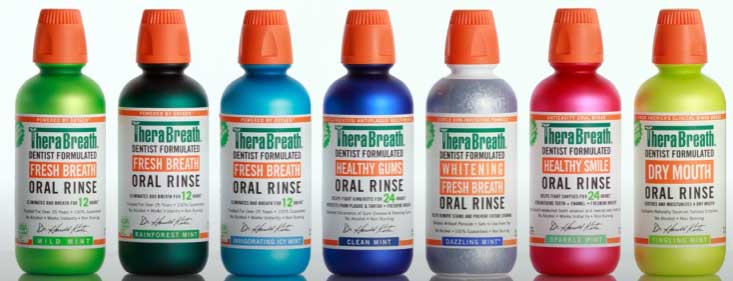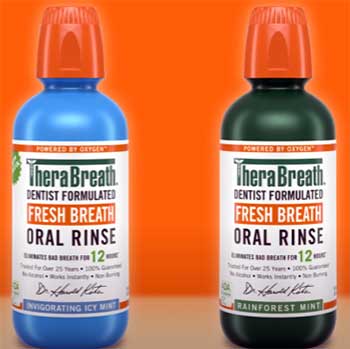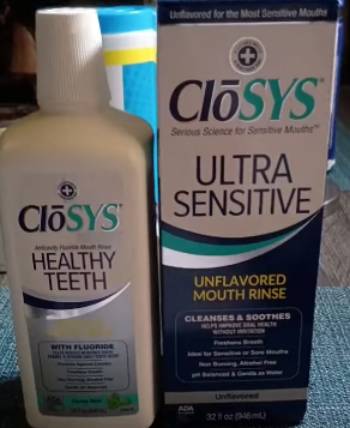If you’re struggling to decide between TheraBreath and CloSYS like I was, this comparison is just what you need.
I’ve personally tested both over several weeks to see which one delivers fresh breath, keeps gums healthy, and is easy on sensitive mouths.
You’ll find my real-life experience, a full breakdown of pros and cons, maintenance tips, and a clear winner based on what matters most to everyday users like us.
Comparison Table: TheraBreath Vs. CloSYS
| Feature | TheraBreath | CloSYS |
| Primary Ingredient | Oxygen-based compounds | Stabilized chlorine dioxide |
| Alcohol-Free | Yes | Yes |
| Flavor Options | Mild Mint, Icy Mint, Rainforest Mint | Unflavored, Gentle Mint |
| ADA Accepted | Yes | Yes |
| Main Purpose | Eliminates bad breath, supports gum health | Kills bacteria gently, great for sensitive mouths |
| Taste Profile | Mild, but can leave metallic aftertaste | Very neutral, occasionally an odd aftertaste |
| Side Effects (if any) | Potential for canker sores, some irritation | Occasional peeling inside the mouth |
| Price Range | Moderate | Slightly higher |
| Best Suited For | Those who want fresher breath that lasts | People with mouth sensitivities or prone to irritation |
My Experience with TheraBreath

I started using TheraBreath during a stretch of days when my breath just wouldn’t stay fresh past lunchtime.
I picked the Mild Mint version because I can’t stand the strong sting of alcohol-based rinses. That first swish? Refreshing and surprisingly easy on the mouth.
After about three days, I noticed my breath didn’t smell stale even after my morning coffee.
By the end of the week, I felt more confident during close conversations. I could actually talk without wondering if I needed a mint.
But then something odd happened. Around day 10, I noticed a slight metallic taste lingering after brushing.
By week two, I had developed two painful canker sores—something I rarely get. I stopped using it for a few days, and the symptoms improved.
When I resumed, they came back. For me, TheraBreath clearly worked, but it had side effects that were hard to ignore.
My Experience with CloSYS

After my issues with TheraBreath, I made the switch to CloSYS. I chose the unflavored version because I didn’t want to risk any further irritation.
The first rinse felt incredibly smooth—no sting, no weird mint explosion, just a subtle clean sensation.
It felt more like a gentle rinse than a harsh chemical solution. My mouth felt hydrated, and my gums weren’t sore after flossing, which often happens with other mouthwashes.
I even noticed less bleeding when brushing around my gum line. After a week, my mouth felt healthier overall.
Now, not everything was perfect. About every other day, I noticed a slight peeling sensation in the inside of my cheeks—not painful, but weird.
It went away on days I didn’t use it. It wasn’t a dealbreaker, but it made me cautious about using it more than twice a day.
Pros and Cons of TheraBreath

Pros:
- Effectively neutralizes bad breath for hours
- Available in several pleasant, non-burning mint flavors
- Helps with minor gum inflammation over time
Cons:
- Some users may experience a metallic taste
- Can cause canker sores in sensitive mouths
- Formula might be too strong for daily use for some
Pros and Cons of CloSYS
Pros:
- Exceptionally gentle on the mouth and gum
- Ideal for people with oral sensitivity issues
- Neutral taste, with the option to flavor if desired
Cons:
- Occasional peeling inside the mouth reported
- Aftertaste isn’t for everyone
- Slightly pricier compared to similar mouthwashes
Maintenance Tips TheraBreath and CloSYS
For TheraBreath:
- Use morning and night, after brushing and flossing
- Don’t eat or drink for 30 minutes after rinsing
- Keep the bottle sealed tight to prevent formula breakdown
For CloSYS:
- Rinse once or twice daily for best results
- Optional flavoring drops can be added if unflavored taste feels too plain
- Store away from heat to preserve its effectiveness
Which One Would I Buy Again?
If breath freshness were my only concern, I’d lean toward TheraBreath. It’s powerful and works fast, and you really do notice a difference by the end of the first week.
But for long-term use, I found CloSYS to be more forgiving on my gums and cheeks. The gentle formula was ideal when my mouth felt raw from dental cleanings or flossing. It felt more like a daily companion, while TheraBreath felt like a weekend fixer-upper.
Ultimately, it depends on what you’re looking for.
Ingredient Breakdown: What’s Actually Inside?

I’ve always been curious about what I’m putting into my mouth, especially with daily-use products.
So I took a closer look at the ingredient lists on both TheraBreath and CloSYS.
TheraBreath’s formula leans heavily on stabilized oxygen compounds, like OXYD-8 (a form of chlorine dioxide), and zinc gluconate.
These ingredients work by oxidizing sulfur-producing bacteria, which are the main culprits behind bad breath.
It also contains aloe vera and sodium bicarbonate to help with soothing and pH balancing.
CloSYS, on the other hand, uses stabilized chlorine dioxide too, but in a more minimal formula. It skips the extra flavorings and focuses more on being non-irritating.
There’s no alcohol, no sulfates, and it’s even gluten-free. It’s basically a mouthwash designed for people who hate mouthwash.
If you’re ingredient-sensitive like I am, CloSYS feels safer. But if you’re looking for something a bit more action-packed, TheraBreath’s blend gives you more targeted support.
Also Read: TheraBreath Vs. Listerine: In-Depth Differences
Effect on Morning Breath: Which One Wins?
Let’s talk about the true test—how your breath smells first thing in the morning.
When I was using TheraBreath regularly before bed, I noticed a significant drop in that morning dragon breath. It didn’t eliminate it completely, but I could easily talk to someone in the morning without covering my mouth. The mint lingers subtly, and it seems to keep bacteria growth at bay overnight.
CloSYS was a bit more subtle. My mouth didn’t feel as “coated” when I woke up, and while it didn’t entirely eliminate morning breath, it did reduce the sticky, dry feeling I sometimes get. I didn’t wake up with a gross film on my tongue, which was a nice bonus.
So for stronger morning breath defense, TheraBreath wins. But for comfort and a less dry mouth feeling overnight, CloSYS takes the lead.
Travel-Friendliness and Packaging
You’d think this wouldn’t matter much, but when I travel, I’m very picky about what gets to take up space in my toiletry bag.
TheraBreath bottles are bulky. Even their smaller travel versions are oddly shaped, and I’ve had a couple of leaks in my suitcase because the cap didn’t seal tight after a few uses.
CloSYS has smaller travel-friendly sizes that are easier to carry, and the flip-top design is more secure.
Plus, the unflavored version makes it less obvious when you’re rinsing in an airport bathroom—no strong minty aroma escaping the stall.
If you’re a frequent traveler, CloSYS is just easier to manage. Less fuss, less mess, and more discreet.
For home use, though, both are fine—it really comes down to shelf space and how often you’re tossing them into a bag.
Also Read: TheraBreath Vs. Listerine: In-Depth Differences
Frequently Asked Questions (FAQs)
While brands like Listerine and ACT are commonly recommended, TheraBreath has increasingly become a top choice among dentists for tackling bad breath without alcohol. It’s also known for being gentle yet effective. That said, the “best” brand often depends on what specific issue you’re addressing—halitosis, dry mouth, or gum care.
Yes, it’s excellent—especially if you have sensitive gums or a low tolerance for strong flavors. It’s gentle, alcohol-free, and doesn’t sting, yet still manages to control bacteria and freshen breath. I found it mild but surprisingly effective for everyday use.
It does, though not in the same way as more aggressively scented mouthwashes. It neutralizes sulfur-producing bacteria using chlorine dioxide, which addresses bad breath at the source instead of just masking it. You might not feel an intense burst of freshness, but your breath will stay neutral longer.
Not quite. Chlorhexidine is a prescription-strength antibacterial mouthwash often used for gum disease and post-surgical oral care. CloSYS is a more gentle, daily-use alternative. While it doesn’t have the same medical-grade power, it’s still very effective for regular maintenance without the staining or taste alteration that chlorhexidine can cause.
Final Thoughts
If you want a powerful mouthwash that targets bad breath and gives immediate results, TheraBreath might be the way to go.
But if your mouth is prone to irritation, or you’ve had issues with harsher rinses in the past, CloSYS is an excellent choice. It won’t knock you out with mint, but it’ll quietly support your gum health and keep your breath neutral.
I personally keep both in rotation now—TheraBreath for the days when I need that extra breath protection, and CloSYS when my mouth needs a break. You don’t have to commit to just one, and it’s okay to switch based on what your mouth needs that day.
In the end, your best choice is the one that fits comfortably into your routine, with results you can feel and a formula you can trust.
